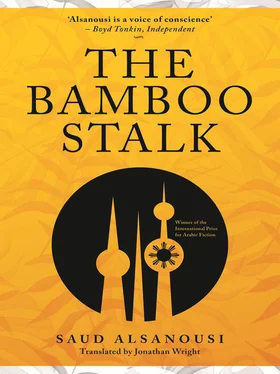Awatif and Nouriya, my other aunts, visited my grandmother every week with their husbands and children. When they were visiting I was forbidden to leave my room in case my uncles, Ahmad and Faisal, found out about me. Although Awatif had shown some sympathy for me at first, she later deferred to her sister Nouriya, who said, ‘Ahmad and Faisal are friends and if Ahmad found out about the Filipino, word might reach my husband. You’d only blame yourself if that were to happen.’ Awatif was weak. One day she gave me, through Khawla, a copy of the Qur’an in English and a prayer mat. After that she disappeared under orders from Nouriya, but I gathered from Khawla that she was always asking whether I prayed. I kept away from all of them. The answer was for me to go out on the day they visited, so their family visits coincided with my visits to Ghassan. He came to pick me up from the house. We either ate out or sometimes in his flat.
In the summer Grandmother spent the weekend, Thursday and Friday, in the beach house with Hind and Khawla. She let me go with them if she knew that none of her other grandchildren would be coming. Grandmother wouldn’t let her other grandchildren have any contact with me, or even know about me, because one rotten fish spoils the rest, as they say. I don’t know, should I find fault with Khawla for telling me everything Grandmother said about me, or should I thank her? She was honest with me, but her honesty was hurtful.
The family gave me a separate suite in the beach house, on the side away from the sea. I wasn’t allowed to go into the main part of the house or go close to the sea, especially if Nouriya was there. The weekly trip to the beach house was like going to prison. We would set off in two cars, one with Grandmother and Khawla, driven by Hind, and the other with Babu, Lakshmi and Luzviminda, driven by Raju. I don’t need to say which car I went in.
The sea was beautiful at night. In fact I never saw it at any other time to compare, because I spent the whole day confined to my miserable room, killing time on the laptop. At night one weekend I left my room and headed for the sea. I walked past three big awnings. Under the first one there was a big generator for when there was a power cut. Under the second there was an old Jeep so covered in dust that it was impossible to make out what colour it was. The third awning was over a small boat. I stood there and examined it. It must be the one! I thought. All the incidents this old boat had witnessed, all the people it had carried — my father, Ghassan, Walid, many fish, chicken guts, and my mother.
I turned my back on the boat, trying to escape memories of events I played no part in making. I hurried to the beach. The air was humid and the sand was cold. The tide was going out, leaving the sand clean and level. If it wasn’t for the tide, my mother’s footprints might still have been there — testimony to the beginning of my tragedy.
I sat down on the wet sand. The calm, the darkness, the sound of the waves in the distance and the humid air took me back to Boracay. The darkness turned everything black. Those days seemed very distant. Distance and space have dimensions we are not aware of. Time runs through them, and the further we move away, the more time recedes into the distance, or so we feel. I could scarcely believe at that moment that it was less than a year since I had been at Boracay. I looked deep into the darkness, where there was no dividing line between the sea and the sky, as if I were looking for Willy’s Rock at Boracay. Nothing disturbed the darkness but the red flashing light towards which my father had sailed one night. I left the beach and went back to my room.
13
One day Khawla knocked on the door of my room in the annex. She said Raju had told Grandmother I was often talking to the servants, and so she was very angry. ‘How can I avoid them when I eat in the kitchen?’ I asked.
’You mustn’t mix with them,’ she said with a smile. ‘So Grandmother’s decided you’ll eat with us inside.’
I gave her a big smile. Thank God you’re such a snitch, Raju , I thought to myself.
Raju was mad about this and asked the other servants why I was in the house, but they pretended to be as ignorant about me as he was.
At my first lunch with Grandmother, Hind and Khawla, I found I couldn’t put anything in my mouth. Khawla was offering me dishes, serving yellow rice from a large bowl and putting it on my plate. She gave me a piece of chicken, tomato sauce, salad, little triangles stuffed with cheese and vegetables and meat, something like mashed rice coloured orange, and various other dishes. Grandmother never looked in my direction. It was as if I didn’t exist. She was rolling the rice into balls with the tips of her fingers and eating in silence. I was daydreaming about Mama Aida, my mother and Adrian, white rice, soy sauce, grilled bananas and crispy chicken’s feet. Poor people’s food is delicious because it’s salted and spiced by the good cheer and warmth that bring you together around it. Rich people’s food has no flavour when they sit there with silent faces. Hind brought me down to earth: ‘Why aren’t you eating?’ she asked.
I was flustered. I had been asking myself the same question: what was stopping me from eating when I was starving? ‘I don’t feel hungry, Auntie,’ I said. This was the first time I had spoken in the presence of Grandmother. Without looking at me, Grandmother opened her eyes wide and took her hand off the bowl of rice in front of her. I thought she must have seen an insect in her bowl. She put her elbows on the table, locked her hands together and rested her forehead on her hands. I didn’t know what to make of it. Khawla and Hind looked at me. ‘I hope I didn’t say something that upset her,’ I said.
As soon as I spoke, Grandmother grabbed the end of the shawl thrown carelessly round her neck and covered her face with it. She began to cry silently. Her body was shaking violently. Hind pushed her chair back, stood up, put a hand on Grandmother’s shoulder and spoke to her gently. Grandmother answered her between sobs, still covering her face with the shawl. Hind smiled, kissed Grandmother’s head and patted her on the back. Khawla was smiling and wiping her tears away with the back of her hand. Hind looked towards me: her nose was red and her eyes were glistening with tears. ‘My mother says you have your father’s voice,’ she said.
Khawla deliberately spoke to me so that I would answer her and Grandmother could hear Rashid’s voice in my own voice. Grandmother picked up the glass of water to drink as she listened, but she didn’t look towards me and she didn’t understand what I was saying in English. She stared into space, or maybe she was looking at the face of her only son in her imagination. The glass of water was still in her hand. She shook her head sadly, with a bitter look on her face, and with her left hand she began to wipe away her tears. She wiped everything away except the sobs she tried to suppress.
Everyone but me finished eating. Grandmother went off to the sitting room, leaning on Hind’s arm. She sat on her sofa in the corner and put her legs on her footstool. Now I started eating and I found that the food tasted completely different. It was delicious. I was watching Grandmother in her corner. ‘Why does she put her legs on the stool like that?’ I asked Khawla.
‘Poor Grandma,’ she said. ‘She has arthritis and problems with her knee joints.’
When I went back to my room after lunch, I asked Lakshmi to bring me two small towels and a bowl of hot water. About half an hour after lunch I called Khawla and asked her to tell Grandmother that I wanted to see her about something. Khawla opened the glass door for me and I found myself standing in front of her with the bowl of hot water and towels in my hands. ‘If you want to wash the car, it’s under the awning over there,’ she said. Khawla was crazy, quick-witted, smart and full of fun. I asked her to bring me some oil. ‘What do you want to do, Isa?’ she said in surprise.
Читать дальше












